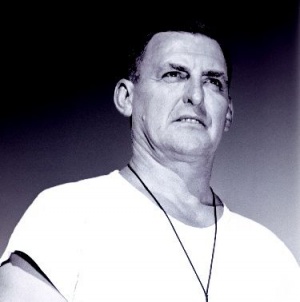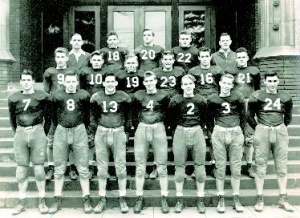Personal tools
Help
Tools
Class Notes
- Do you have news for fellow WSU alumni and other readers of Washington State Magazine? Send us your class note.
Our Story
written by alumni, faculty and friends.
NOTE: THIS IS A LEGACY SITE AND IS NOT REGULARLY MAINTAINED
Views
A titan's tale
From Our Story
By Bill Morelock
From Washington State Magazine, Summer 2002
My grandfather, born in the mythical past of 1900 and living until 1981, was a titan. I have a vivid memory of him in a great coat and fedora, his proud, imperious Prussian (literally, Titanic: Teutonic) smile three miles above my eyes. He bent down to mortal earth and handed me a box. I tore it open with a hunger that surprised me even then. I kept that baseball glove close at hand for 15 years.
Forty years, and 20 after his death, is time enough for the usual reassessments, rich loam for the rooting and growth of resentments. He was a strong man, and a difficult one (What titan isn't?), and he left his marks. But whenever I find myself playing the game of myth-busting, trying to bring the old man down few notches, invariably a kind of heroic bedrock gets in my way and makes the whole exercise ridiculous. I run into a pile of letters he received from Pacific beaches and African deserts and French villages, remember who wrote them and some of what they said and what my grandfather did with them. And then I realize, still, that he was a titan.
This is the story of a story he told me once and never again.
My grandfather's name was Bill Nollan. He coached four sports at Seattle's Lincoln High between 1929 and 1956. He played three himself at Washington State College, graduating in 1926. He won city championships in football, baseball, and track, state championships in basketball, and became something of a legend during an era when the big-time sportswriters in town would spend serious thought and ink on high school sports. Full-page caricatures illustrated pre-season profiles. Even epithets and enmities developed. Royal Brougham of the Seattle P-I called Nollan "Weeping Willie of Wallingford" for his histrionics on the sidelines. Brougham and my grandfather maintained a kind of feud for years.
He also taught P.E., and seriously. For every boy he kept an index card with a record of his height and weight for each of his four years in school, plus his improvement, or lack of it, in basic skills and strength tests: pull-ups, sit-ups, sprints, and distance runs.
And he said more than once that his favorite sport to coach was track, because he never had to cut anyone, and excellence was all about improvement. He may have railed and stomped, but it wasn't in quest of the Great Prize. He just loved the order of excellence, loved to teach it and preach it, from performance to the care and maintenance of equipment. And, of course, I think it was just in his nature, like a rooster, to fill his lungs with air and let it out violently.
Extrapolating from an old photo, I see him on a sea of grass within a cinder track on a warm afternoon in May, standing with his legs apart, fists on his hips, surveying the carnival of exertion and exhaustion he orchestrated every day throughout the spring.
He wore, as always, grey sweats and a white t-shirt. A whistle on a leather lanyard was clenched between his teeth.
He'd encouraged and pushed and berated and praised hundreds of boys. He was, by the testimony of every athlete who'd ever had the fortunate ill luck to run and jump and throw for him, a tyrant, a drill sergeant, a martinet, a merciless fiend. A man of the better- to-be-respected-than-loved school. He was Coach.
I knew him years later-long after the boys, thin-clad or in spikes or helmets, had filled out and grown into men who wore suits, or overalls, or grey sweats with whistles in their teeth, or got left behind on beaches with fabled names. To me he was also tyrant, drill sergeant, martinet. But those were just synonyms I learned later for Grandpa. He hadn't changed. "Flat-bellied, ramrod straight, the youngest 67-year-old man in town," Royal Brougham admitted in the late 60s. Time spent with him was time spent in close order drill, at attention, mentally scrubbing latrine fixtures. He was demanding, unyielding. And as a teenager at the height of the great divide of 1970-when war and assassination and pursuits of pleasure and world views distilled into t-shirt slogans were constant, volatile flashpoints between old and young-I might naturally have turned away from his regimentation and his odd discipline in small things: how you say good morning, how you sit at a table, how well you understand by what path the food you eat came to that table. And I would have turned away. But he had these stories.
He'd debated with Ted Williams how to grip a bat.
He coached a quarter-miler named Ralph Mast, a high-schooler who ran 49.1, in 1937, without spikes, without blocks, on a cinder track. One watch got him in 48.9.
His very first coaching job was in Pasco in 1926. This tennis-basketball-baseball player was hired to coach football. Not knowing anything about the game, he stalled for time by making his players repeat a few blocking and tackling drills picked up from a Washington State College fraternity brother until they began to ask, "Coach, when are we going to run some plays?" Fundamentals mastered, plays added at the last minute, Pasco crushed its first opponent. The amazed young coach built a career on that lesson.
As a student himself at Lincoln he and his doubles partner Bob Hesketh dominated Seattle tennis. In 1921, on his way to college, a man approached him and asked if he wanted to become a professional tennis player and represent a little sportswear company he'd just started. It sounded interesting, but professional tennis was just a series of barnstorming exhibitions in those days. My grandfather had his heart set on college and coaching and he told Eddie Bauer thanks, but no thanks.
Beginning in the fall of '42, physical education became basic training. Bill Nollan set up army-style obstacle courses at Lincoln High School and began redefining the students' epithets for him.
I speculate here, perhaps recklessly. I don't, and never did know the man's mind. He only told the story once. The details aren't complete. But it was the best story he ever told. And I yield to the temptation of expanding upon a titan's tale and his tone of voice to a whole nest of emotions he never offered.
Here, in this world of his, where he commanded platoons of athlete-warriors battling with their legs and their strengths and their skills-only the prepared and the trained would win, would survive. So now he drove them with an added fury because the stakes were not only higher, they were off the charts, out of his ken, beyond his ability to map cause and effect, training and winning.
In June these boys would turn into soldiers and sailors. And they would face . . . the tyrant was humbled when he thought of what they would face; the war was like a personal affront to him. He was humbled because he didn't know, because he never would, and he couldn't imagine or presume to know.
He knew he didn't understand. He didn't like not understanding. So he drove his athletes and his students ever harder. As if their lives depended on it.
In the summer of '43, he said, he received the first of the letters. "I made corporal faster than anyone in my platoon because I was so physically well prepared," was a typical story, along with the inevitable, and likely for the boy writing it, astonishing addendum: "Thanks."
As the graduating class of '43 progressed from training to assignments the gratitude changed character. From the Pacific: "Coach, I think I may still be alive because of you." No more specifics in the old man's story, except that, "They told me things I wouldn't repeat."
After the war, he said, he began to send the letters back-along with each boy's P.E. card. It was a process of years, but he sent them all back. Either to the men or, in some cases, the men's families. He did this, I think, because of a certain code-Titan's code, now either discredited or smiled at-that he lived by and would have questioned about as often as he would have questioned the value of breathing. These boys, to whom he had nothing any longer to teach, who had lived, had existed to a degree he would never know, awed him. He had nothing left to give them but his gesture of respect (because a man wants to be respected more than he wants to be loved). My grandfather's gesture of respect acknowledged that a man who has known fear and confides it, would not want his confession at large in the world. And he sent the letters back.
He followed his code unerringly, though I doubt that the boys, the men, needed the letters back for the reasons the titan thought. They weren't ashamed of what they told Coach. They wrote to him in their pride and their terror and their triumph because they did love him-with that vigorous, outlandish love a boy can have for a man who drives him like a dumb ox, for some greater good. They saw and understood, that he had seen and understood before them, and did his best in his helplessness (an awful thing) to do what he had always done. To turn a boy into a man and give him the tools to survive.
Bill Morelock '77 is a writer and broadcaster. He and Bob Christiansen created the NPR classical music radio show Bob & Billat WSU in 1988. Today he can be heard weekdays on WCAL-FM, Northfield, Minnesota (wcal.org) from 3:00 to 7:00 p.m. Central Time.
Our Story site map
Our Story main page | Our Story categories | Help Desk
Contact | Give | Advertise
Washington State Magazine | Washington State University | Class Notes
Our Story is coordinated by
In partnership with
Our Story and Washington State Magazine are publications of Washington State University. All rights reserved.
P.O. Box 641227, Washington State University, Pullman, WA 99164-1227 USA | wsm@wsu.edu, 509-335-2388
Accessibility | Copyright | Policies


